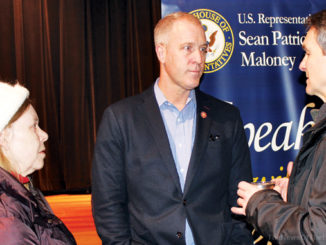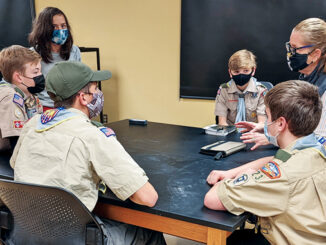Black History Month observance held
Several dozen community residents gathered at the American Legion Hall on Saturday to participate in a prayer breakfast that featured speakers Rev. Agnes Saffourey, Lt. Col. Rick Black, and Rev. Judy Ferguson.
Saffourey opened the event.
“The African American experience, if nothing else, is a testimony to the power of faith and hope, and a sense that better days are coming,” Saffourey said in the opening remarks at the event. “That’s a common theme in the Bible … better days are coming. It’s also the cornerstone of Black History. So here we are, with recognition for racial unity and racial diversity, with thanksgiving, with confession, and a hope for forgiveness. Be strong, and courageous.”
Black, a military history professor at West Point, spoke with the attendees on one individual and two groups — all local to this area — who are important figures in black history, but are not the ones often heard about.
The first was William Lee (1750-1828), a slave owned by George Washington who was in service with him for nearly two decades. He was the only one of Washington’s slaves freed immediately by Washington in his will.
“Today we would call him the general’s aide, or valet,” Black said, “or maybe personal assistant. William Lee was at every battle that Washington fought. He was the guy that maintained his horse, took care of his uniforms, took care of his binoculars … it was an important position, only trusted to reliable people.”
He continued: “Will Lee slept right outside Washington’s door, armed with a sword, to make sure that nothing ever happened to Washington at night. Like George Washington, Will Lee fought for his country. For awhile there, he was probably the most famous person of color in the entire country.”
Black suggested those interested look up a painting by John Trumbull from 1780, which shows the general above the Hudson River. Also in the painting, in the background, is Will Lee.
The second mention was of World War I’s 369th Infantry Regiment, also known as the Harlem Hellfighters. They were a Harlem, NY based group of soldiers, first organized in 1916 as the 15th New York National Guard Infantry Regiment. It was made up of black enlisted soldiers with both black and white leadership, Black said.
The unit encountered racism and segregation wherever they went.
“However, they eventually fell under French command,” he said, “where life improved.”
They displayed great bravery, and served honorably, Black said and eventually received honors for the work they did, from first the French government and then eventually the US government.
While the first two were not familiar to most in the room, the third was. He spoke about Buffalo Soldiers and their importance at West Point, “doing all of the jobs that no one else wanted to do”, as well as teaching cadets to ride horses.
He spoke to the legacy of longtime Highland Falls resident and proud Buffalo Soldier Sgt. Sanders Matthews, noting that he’s proud that West Point was able to spend hours with Sgt. Matthews recording his life story, and his recollections of his days as a Buffalo Soldier.
There was significant fond laughter in the group as Black talked about some of Matthews’ stories. He died in 2016.
Rev. Ferguson closed the event with a few words and a benediction. She spoke about how the Episcopal Church is currently working on looking back at its own actions during the era pre-civil rights that may have helped in “fostering prejudice and bigotry”.
“We are to look, explore the history and write about it to preserve it, so it doesn’t get swept under the carpet,” she said.
The breakfast was sponsored by The Center and served as a fundraiser for the American Legion. Elected officials Bob Livsey (Town of Highlands supervisor), Laurie Tautel (Orange County legislator) and Brian Aylward (Highland Falls trustee) were on hand, as was American Legion Commander John Flynn.
Ann Molina served as the mistress of ceremony, introducing the guests and giving the closing remarks. She thanked the speakers and their lessons in history and said that she wishes people would read more, or take time to learn about black history however they can.
“I think it would go a long way in how we all treat each other,” she said.
The next day, Molina served as the speaker at St. Mark’s Baptist Church’s Black History Month program.



